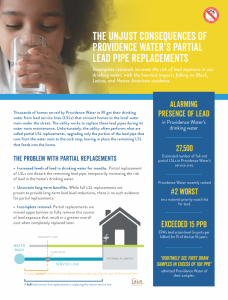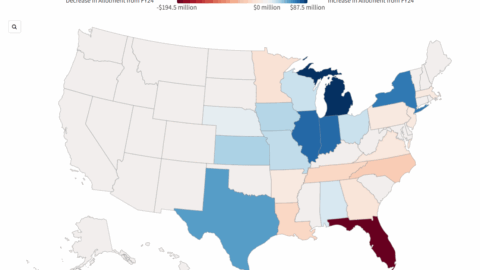Civil rights complaint draws attention to the discriminatory impacts of common lead pipe replacement practice
Jennifer Ortega, Research Analyst, Environmental Health
This past Wednesday, Rhode Island’s Childhood Lead Action Project (CLAP) led a coalition of groups in submitting a civil rights complaint to the Environmental Protection Agency (EPA) against the Providence Water Supply Board (Providence Water), pursuant to the Civil Rights Act of 1964.
The administrative complaint highlights the discriminatory effects that can result when utilities require customers to share the cost of replacing the lead pipes that feed into their homes. The complaint was submitted as part of CLAP’s larger Lead-Free Water RI campaign, which calls “for an equitable, statewide plan for full, free lead pipe replacements for all Rhode Islanders.”
In the complaint, CLAP, South Providence Neighborhood Association, Direct Action for Rights and Equality, National Center for Healthy Housing, and EDF allege that the water utility’s process of replacing lead service lines (LSLs) — the lead pipes that run from the water main to the water meter in homes — has a disparate impact on Black, Latinx, and Native American residents in violation of Title VI of the Civil Rights Act of 1964 and EPA’s implementing regulations.
Providence Water’s water main infrastructure work results in a partial LSL replacement – replacing only the lead pipe from the water main to the curb stop – when the customer does not agree to, or cannot afford to, pay to replace the portion of the line on private property. These partial LSL replacements increase the risk of lead in residents’ drinking water.  EPA’s Science Advisory Board found in 2011 that partial replacements result in higher lead levels in the short-term without the reliable long-term reductions in lead afforded by full replacements.
EPA’s Science Advisory Board found in 2011 that partial replacements result in higher lead levels in the short-term without the reliable long-term reductions in lead afforded by full replacements.
Providence Water replaces the part of the LSL on public property at no cost to customers. However, it requires customers pay to replace the part of the LSL on private property, which can cost up to $4,500 as detailed in CLAP’s factsheet about the complaint. If homeowners or landlords cannot afford this, or if they choose not to pay, the utility proceeds with the partial LSL replacement that subjects residents to harmful short-term effects and ongoing risks from the lead pipe that remains.
No one who lives in a home connected to an LSL should have to face the higher lead levels that result from partial replacements while half the lead pipe remains on private property. Instead, everyone should have a realistic opportunity to have the lead pipe fully replaced. Unfortunately, this is not the case. A recently published study by Dr. Karen Baehler at American University found that low-income residents are less likely than wealthier residents to pay for the replacement of the LSL on private property, presumably because of financial constraints.
The City of Providence has acknowledged that communities of color are “disproportionately low-income, reside in neighborhoods with the lowest homeownership rates, and experience higher rates of cost burden.” This is likely due to the history of underinvestment and redlining that continues to economically impact communities of color in the city’s neighborhoods. A researcher at American University (who ran the statistics in the previously mentioned study) provided a demographic analysis for the complaint that displayed the correlation between race and income between residents in Providence Water’s service area.
The analysis showed that low-income residents in the utility’s service area are more likely to be Black, Latinx, and Native American while wealthier residents tend to be white. These findings indicate that, in general, Black, Latinx, and Native American residents in Providence have less of an ability than white residents to pay for a full LSL replacement, according to the complaint.
The evidence detailed in the complaint also describes how renters, in particular, suffer the consequences of Providence Water’s practices, since the critical public health decision of fully replacing an LSL is left to their landlords. Landlords may choose not to pay the portion of the LSL replacement – not offering their tenants a choice at all or disregarding their requests. In the utility’s service area, 88% of Native American residents, 69% of Latinx residents, and 64% of Black residents who are “head of household” rent their homes, adding to the disproportionate impacts on people of color.
The complaint calls on EPA to investigate the issue and to direct Providence Water to:
- Conduct full LSL replacements for all residents at no cost to customers;
- Obtain community input to determine the most effective way to conduct outreach and education that prioritizes Black, Latinx, and Native American residents; and
- Ensure that any changes resulting from the complaint do not result in unintended consequences for Black, Latinx, and Native American residents.
On the same day the complaint was filed, Tom Neltner, EDF’s Senior Director of Safer Chemicals, provided comments to the National Environmental Justice Advisory Council (NEJAC) about the environmental justice implications of utilities’ LSL replacement practices presented in Dr. Baehler’s study and the complaint. He encouraged NEJAC to monitor the developments associated with the study and the complaint and encouraged EPA to send guidance to state revolving loan fund program administrators describing their obligations to proactively ensure compliance with the Civil Rights Act of 1964 regarding LSLs. He also recommended that EPA should then audit state and utility compliance for projects that disturb drinking water mains, since they often result in partial LSL replacements.
The complaint was produced using a template developed in 2021 by the Emmett Environmental Law and Policy Clinic at Harvard Law School. The Clinic and EDF may be available to guide and assist other environmental justice organizations interested in assessing possible civil rights violations related to partial LSL replacement practices.












